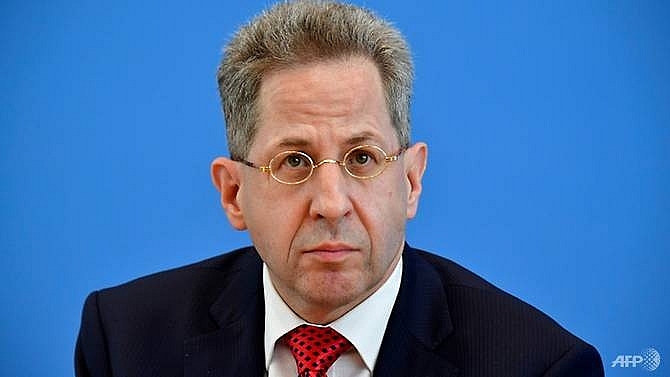Merkel govt finds new post for spy chief to defuse coalition row
 |
| Outgoing spy chief Hans-Georg Maassen had been in line for a promotion and more money but a compromise has defused the controversy that move engendered. (Photo: AFP/Tobias Schwarz) |
They agreed that Hans-Georg Maassen, 55, who leaves the post as chief of the BfV security agency, be appointed special representative for internal security, said the chancellery.
Crucially, the new job in the interior ministry does not come with a raise in pay or status, after an earlier proposal to give Maassen the more senior post of state secretary had sparked a public outcry.
The dispute centres on controversial comments by Maassen that appeared to play down the severity of far-right racist mob violence in the eastern city of Chemnitz last month.
Merkel's junior partners, the centre-left Social Democrats (SPD), then strongly pushed for Maassen to be fired, while hardline Interior Minister Horst Seehofer of the conservative Bavarian CSU had defended the spy master as a competent bureaucrat beyond reproach.
A shaky compromise deal reached last Tuesday - to shift Maassen to the more senior and better paid state secretary post - had sparked even more anger and ridicule and heightened pressure on SPD party chief Andrea Nahles for accepting a bad deal.
With the scandal entering a second round, the three party leaders met Sunday to resolve the tricky issue.
The dispute rocking the government of the EU's top economy has, many observers said, bordered on political farce and showed the weakness of Merkel as the leader of a loveless three-party alliance she had to cobble together for her fourth term.
TRUST BADLY SHAKEN
An Emnid poll for Bild am Sonntag newspaper found that 67 per cent of respondents no longer believed the three party chiefs still shared a common basis of trust, although a narrow majority also rejected the options of new elections now.
All major parties suffered in last September's election as the far-right Alternative for Germany (AfD) party took millions of their votes, capitalising on public fears and anger over immigration.
Since Merkel's decision three years ago to allow a mass influx of mostly Muslim migrants and refugees, the issue has come to dominate political debate at the expense of other policy matters.
Tensions flared again last month after a fatal knife attack in Chemnitz - in which the top suspects are asylum seekers - triggered xenophobic mob violence that shocked Germany and the world.
Merkel deplored the unrest, but Maassen soon contradicted her and questioned whether any "hunting down" of foreigners had taken place, and whether amateur video footage of the confrontations had been fake.
While his comments were cheered by the far right, the three opposition parties and the SPD demanded he be fired for meddling in politics.
The main beneficiary of the row has been the AfD, which calls Merkel a "traitor" and rails against "establishment parties".
The Emnid poll said the AfD would garner 16 per cent of votes if elections were held now.
Merkel's CDU/CSU conservative block scored 28 per cent and the SPD 17 per cent - giving their shaky coalition a total of 45 per cent, its lowest ever support in the survey.
What the stars mean:
★ Poor ★ ★ Promising ★★★ Good ★★★★ Very good ★★★★★ Exceptional
Related Contents
Latest News
More News
- Russian President congratulates Vietnamese Party leader during phone talks (January 25, 2026 | 09:58)
- Worldwide congratulations underscore confidence in Vietnam’s 14th Party Congress (January 23, 2026 | 09:02)
- Political parties, organisations, int’l friends send congratulations to 14th National Party Congress (January 22, 2026 | 09:33)
- 14th National Party Congress: Japanese media highlight Vietnam’s growth targets (January 21, 2026 | 09:46)
- 14th National Party Congress: Driving force for Vietnam to continue renewal, innovation, breakthroughs (January 21, 2026 | 09:42)
- Vietnam remains spiritual support for progressive forces: Colombian party leader (January 21, 2026 | 08:00)
- Int'l media provides large coverage of 14th National Party Congress's first working day (January 20, 2026 | 09:09)
- Vietnamese firms win top honours at ASEAN Digital Awards (January 16, 2026 | 16:45)
- ASEAN Digital Ministers' Meeting opens in Hanoi (January 15, 2026 | 15:33)
- ASEAN economies move up the global chip value chain (December 09, 2025 | 13:32)

 Tag:
Tag:




















 Mobile Version
Mobile Version